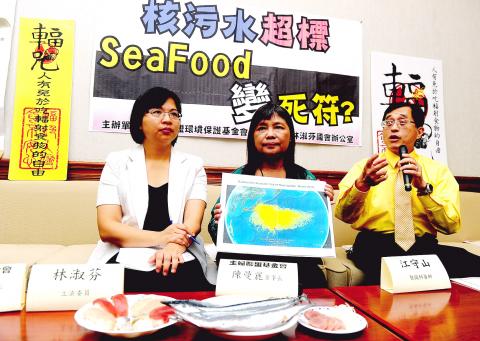The Homemakers United Foundation yesterday urged the government to enforce stricter radiation inspections on imported food.
The group issued the call following the confirmation by Tokyo Electric Power Co, operator of Japan’s Fukushima Dai-ichi nuclear power plant, that 300 tonnes of radiation-contaminated water from a steel tank had leaked into groundwater and possibly into the sea.
Foundation president Chen Man-li (陳曼麗) said radiation leakage from Fukushima has contaminated the seawater and nearby soil, and while many Taiwanese like to eat seafood, the government has not taken any precautions against the importation of possible contaminated food from Japan.

Photo: CNA
“It’s been two years since the Fukushima Dai-ichi nuclear disaster, but the total number of samples [of food products imported from Japan tested for radiation levels] is only 40,000, while Hong Kong’s authorities have already tested more than 150,000 samples,” she said, adding that both South Korea and Hong Kong immediately release their reports on contaminated food to the public.
Democratic Progressive Party (DPP) Legislator Lin Shu-fen (林淑芬) said that government statistics showed that the number of food samples tested during a week in Taiwan (202 from Aug. 19 to Aug. 25 this year) is fewer than the number tested during one day in Hong Kong (299 between 12am Aug. 19 and 12am on Aug. 20), and that the permitted level in Taiwan was even raised last year.
Chiang Shou-shan (江守山), a nephrologist at Shin-Kong Wu Ho-Su Memorial Hospital, suggested that the public avoid eating migrating fishes, such as tuna, flounder and greenling, because they may have higher levels of radiation accumulated in their bodies.
Although some forms of radiation can be blocked by wearing an aluminum or radiation protection suit, our stomachs remain unprotected, he said, adding that radioactive substances in food may continue to damage the body for a long time after consumption.
Meanwhile, in related developments, the DPP, noting the state-run Taiwan Power Co’s (Taipower) refusal to arrange former Japanese prime minister Naoto Kan’s visit to the No. 1 reactor at the Guosheng Nuclear Power Plant in Wanli District (萬里), New Taipei City (新北市), because of Kan’s anti-nuclear position, said yesterday that Taipower seemed to be implying that only those who supported nuclear energy would be welcome to visit power plants.
“The refusal highlighted Taipower’s pro-nuclear position and its violation of diplomatic protocol,” DPP spokesperson Lin Chun-hsien (林俊憲) said.
The President Ma Ying-jeou (馬英九) administration and Taipower have both violated Article 23 of the Basic Environment Act (環境基本法), which stipulates that the government must make plans to gradually achieve the goal of becoming a nuclear-free country, Lin said.
Kan is slated to visit Taiwan from Sept. 12 to Sept. 15 for a series of events to express his opposition to nuclear power.
Additional reporting by Chris Wang and CNA

Several Chinese Nationalist Party (KMT) officials including Chairman Eric Chu (朱立倫) are to be summoned for questioning and then transferred to prosecutors for holding an illegal assembly in Taipei last night, the Taipei Police said today. Chu and two others hosted an illegal assembly and are to be requested to explain their actions, the Taipei City Police Department's Zhongzheng (中正) First Precinct said, referring to a protest held after Huang Lu Chin-ju (黃呂錦茹), KMT Taipei's chapter director, and several other KMT staffers were questioned for alleged signature forgery in recall petitions against Democratic Progressive Party (DPP) legislators. Taipei prosecutors had filed

Taiwan would welcome the return of Honduras as a diplomatic ally if its next president decides to make such a move, Minister of Foreign Affairs Lin Chia-lung (林佳龍) said yesterday. “Of course, we would welcome Honduras if they want to restore diplomatic ties with Taiwan after their elections,” Lin said at a meeting of the legislature’s Foreign Affairs and National Defense Committee, when asked to comment on statements made by two of the three Honduran presidential candidates during the presidential campaign in the Central American country. Taiwan is paying close attention to the region as a whole in the wake of a

President William Lai (賴清德) has appointed former vice president Chen Chien-jen (陳建仁) to attend the late Pope Francis’ funeral at the Vatican City on Saturday on his behalf, the Ministry of Foreign Affairs said today. The Holy See announced Francis’ funeral would take place on Saturday at 10am in St Peter’s Square. The ministry expressed condolences over Francis’ passing and said that Chen would represent Taiwan at the funeral and offer condolences in person. Taiwan and the Vatican have a long-standing and close diplomatic relationship, the ministry said. Both sides agreed to have Chen represent Taiwan at the funeral, given his Catholic identity and

NEW WORLD: Taiwan is pursuing innovative approaches to international relations through economics, trade and values-based diplomacy, the foreign minister said Taiwan would implement a “three-chain strategy” that promotes democratic values in response to US tariffs, Minister of Foreign Affairs Lin Chia-lung (林佳龍) said. Taiwan would aim to create a “global democratic value chain,” seek to capitalize on its position within the first island chain and promote a “non-red supply chain,” Lin was quoted as saying in the ministry’s written report to the Legislative Yuan submitted ahead of the legislature’s Foreign Affairs and National Defense Committee meeting slated for today. The Ministry would also uphold a spirit of mutual beneficial collaboration, maintaining close communication and consultations with Washington to show that Taiwan-US cooperation